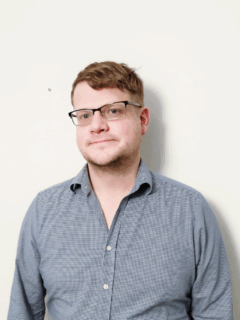Philipp Winkler, M.A.
Philipp Winkler, M.A.
- Seit Juli 2024 Wissenschaftlicher Mitarbeiter am Lehrstuhl für Politik und Gesellschaft des Nahen Ostens
- April 2023-September 2024 Wissenschaftlicher Mitarbeiter an der Professur für Arabistik, Otto-Friedrich-Universität Bamberg
- 2018-2022 Promotionsstipendiat des Evangelischen Studienwerk Villigst (Titel: “Vietnam and Cuba as revolutionary role-models? Debates among the Arab Left since 1967”)
- 2015 Masterarbeit „The Path to Modernity: Socialism and the Soviet Union in the Eyes of the Arab Socialists. The Cases of Egypt, Syria and Iraq“
- bis 2015 Studium der Geschichte und Politikwissenschaft in Erlangen (Deutschland) und Izmir (Türkei)
- Bevölkerungspolitik und Bevölkerungsentwicklung
- Nationalismus und Nationsbildung
- Modernes politisches Denken in der arabischen Welt
- Geschichte und Gegenwart der arabischen Linken
- Gender Politics in der MENA-Region
- Arab Visitors’ Accounts of the Socialist Experiment. How Arab Travelers Saw the Soviet Union in the Post-Stalinist 1950s, in: Albrecht Fuess, Heidi Hein-Kircher, Julia Obertreis, Stefan Rohdewald (Hrsg.): Mobility Dynamics between Eastern Europe and the Near East. Exploring a Cross-Regional Shared History. Stuttgart: Franz Steiner Verlag 2024, S. 207-228.
- Maḥmūd Muḥammad Ṭāhā’s “Second Message of Islam”, in: Maha El Kaisy-Friemuth, Reza Hajatpour und Mohammed Abdel Rahem (Hrsg.): Rationalität in der Islamischen Theologie,Band II: Die Moderne. Berlin: de Gruyter 2022, S. 137-168.
- The ‘Che Guevara of the Middle East’: Remembering Khalid Ahmad Zaki’s Revolutionary Struggle in Iraq’s Southern Marshes, in: Guirguis, Laure (Ed.): The Arab Lefts. Histories and Legacies, 1950s–1970s, Edinburgh: Edinburgh University Press 2020, S. 207-221.
“Vietnam and Cuba as revolutionary role-models? Debates among the Arab Left since 1967”
This project examines the political and ideological orientations of the Arab Left after the crushing defeat by Israel in June 1967 in respect to its views of other „Third World“ revolutionary movements. This event caused a lively debate among the Arab Left’s protagonists, who started looking for models of successful anti-imperialist struggles in other parts of the Third World that they could imitate. They especially admired the Vietcong’s war against the USA and the movements started by Che Guevara as „model revolutions“. The core of the thesis will be an analysis of the discourse of the Arab Left in its most important theoretical journals in the years after 1967 with regard to those topics. In addition to that, interviews with former activists will be conducted. Sojourns in Beirut and Alexandria will provide access to the required sources. The project will make an important contribution to the field of transnational intellectual history by examining so-far neglected connections between different parts of the Third World. By providing deeper insights into the trajectory of the Arab Left, it will also help to understand its decline after 1970 and the concurrent rise of Islamist movements in the Arab World.
The project is supported by a PhD-fellowship of the Evangelisches Studienwerk Villigst.
